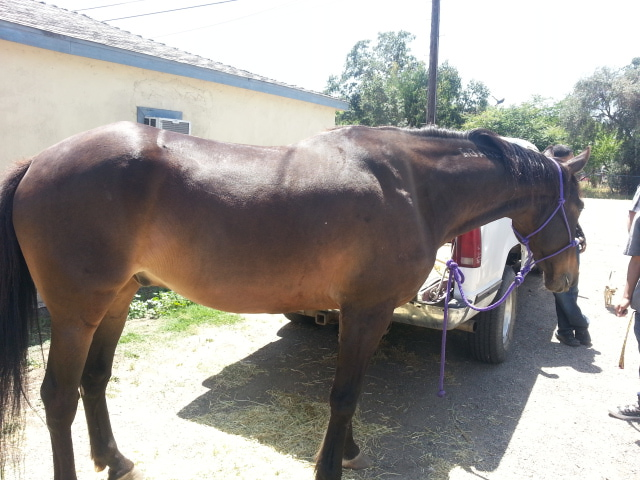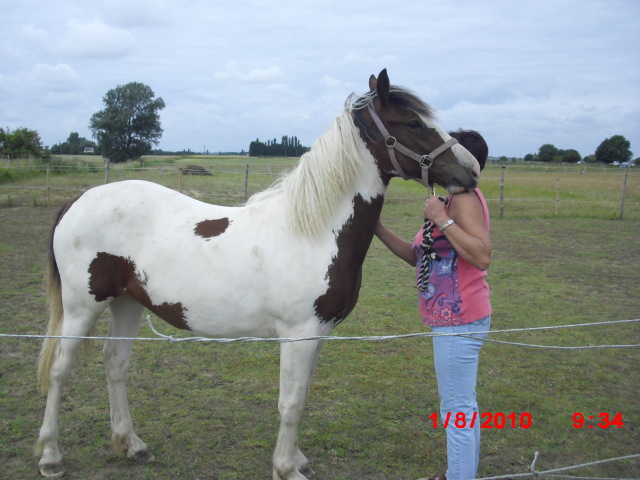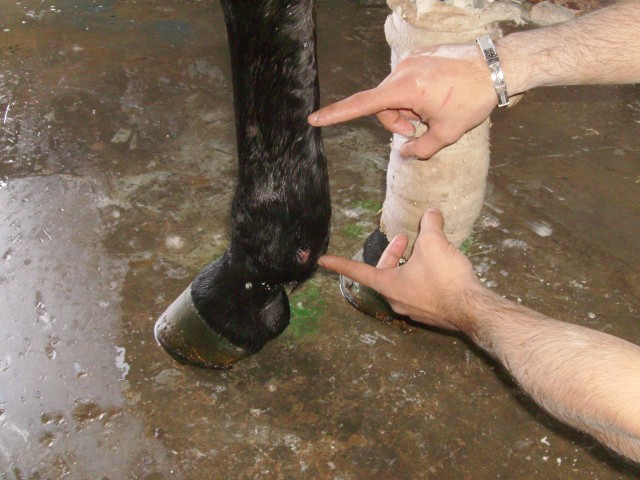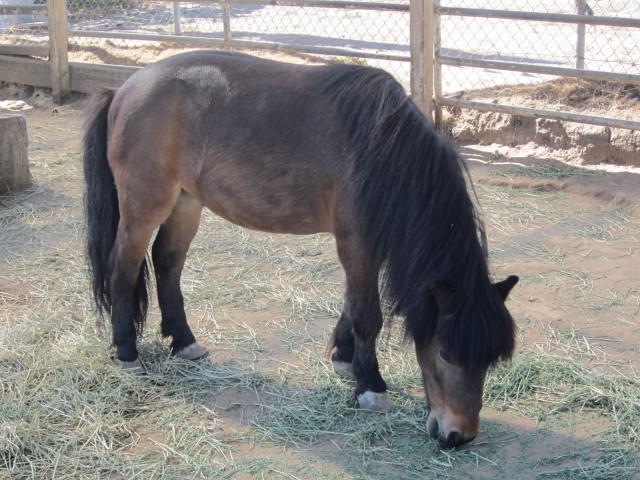QuestionQUESTION: Hi
I read your page and your experience with horses and what you can help with and thought you would be the best person to ask so I have a few questions for you. I have a 12 year old quarter horse cross gelding. He is "said to be" very well broke and did quite well when i rode him in his old home(i rode him with one other horse and then by himself in the arena). He did great with everything when i worked him there. And he has done pretty good up here, but as of late he has started to get some behavior problems. Like when I am grooming him on his underbelly(especially towards the front) he will paw and he has just started to lift his back leg. I immediately scold him(use a loud, stern voice) for this and smack his leg. I am not sure why he is doing this, i have seen no wounds that would cause him pain or anything he could of hurt himself on. Do you know why he could be doing this? And when i am cleaning his feet out he trys to pull them away now or trys to move away, if he shifts too much i let his leg down and then let him reposition himself and i pick it right back up. Do you know why he might be doing this? He was last ridden in November(shortly before i got him here) and he did fine, although he did get girth itch shortly before coming to me, so he was a little touchy in that area, but it is cleared up now and he is fine about it being touched. The reason i havent been able to ride him as i dont have an indoor riding arena and it was really icy and the snow just finally melted a couple days ago and now i am waiting for the yard to dry up. Should i just saddle him up and walk him around at first and let him get used to it all again? He is said to be from a ranch out west and the guy who i bought him from buys and sells horses and he seemed quite honest about him. And he is used to being ridden in a snaffle bit, do you think it would hurt to switch him to a curb bit(i believe that is what it is called)? or should i leave him with a snaffle. He is well broke enough to just ride with a halter and lead rope and you can just go out and pick up his feet in the pasture(as long as he knows you, but i tie him just til we have established a better bond). All together he is a great horse he just seems to be getting a bit sloppy with his manners. I am 16 years old and been working with horses since i was 9. I did have a VERY herd sour mare when i was 12 that ruined alot of my confidence but i gained a ton back on a great gelding that we had. So to say the least i have had good and bad experiences with horses. I have worked with weanlings to older horses. Sturgis used to be with a couple other horses and then shared a barn with a mini but is now by himself, just a billy goat as a barn companion. He has adjusted to being alone quite nicely, but i am thinking of purchasing another horse, just havent found the right one. He is kept in a small paddock with a run-in shelter at the moment but will have a pasture once it starts growing again. Any help will be greatly appreicated. Thanks.
Kelli
ANSWER: Hi Kelli, you have some good questions, I like to answer questions that are not private so others can read and learn from it as well. Would you mind resending this as not private. If there is a good reason to be private, let me know and I will answer you as private. thanks,
Rick
PS: Look to yourself for the problem not the horse. My answer to all of your questions relate to you not the horse. Read my horsemanship page on my website and it may explain a little, but send the question back and I will answer it. :)
---------- FOLLOW-UP ----------
QUESTION: Hi
I read your page and your experience with horses and what you can help with and thought you would be the best person to ask so I have a few questions for you. I have a 12 year old quarter horse cross gelding. He is "said to be" very well broke and did quite well when i rode him in his old home(i rode him with one other horse and then by himself in the arena). He did great with everything when i worked him there. And he has done pretty good up here, but as of late he has started to get some behavior problems. Like when I am grooming him on his underbelly(especially towards the front) he will paw and he has just started to lift his back leg. I immediately scold him(use a loud, stern voice) for this and smack his leg. I am not sure why he is doing this, i have seen no wounds that would cause him pain or anything he could of hurt himself on. Do you know why he could be doing this? And when i am cleaning his feet out he trys to pull them away now or trys to move away, if he shifts too much i let his leg down and then let him reposition himself and i pick it right back up. Do you know why he might be doing this? He was last ridden in November(shortly before i got him here) and he did fine, although he did get girth itch shortly before coming to me, so he was a little touchy in that area, but it is cleared up now and he is fine about it being touched. The reason i havent been able to ride him as i dont have an indoor riding arena and it was really icy and the snow just finally melted a couple days ago and now i am waiting for the yard to dry up. Should i just saddle him up and walk him around at first and let him get used to it all again? He is said to be from a ranch out west and the guy who i bought him from buys and sells horses and he seemed quite honest about him. And he is used to being ridden in a snaffle bit, do you think it would hurt to switch him to a curb bit(i believe that is what it is called)? or should i leave him with a snaffle. He is well broke enough to just ride with a halter and lead rope and you can just go out and pick up his feet in the pasture(as long as he knows you, but i tie him just til we have established a better bond). All together he is a great horse he just seems to be getting a bit sloppy with his manners. I am 16 years old and been working with horses since i was 9. I did have a VERY herd sour mare when i was 12 that ruined alot of my confidence but i gained a ton back on a great gelding that we had. So to say the least i have had good and bad experiences with horses. I have worked with weanlings to older horses. Sturgis used to be with a couple other horses and then shared a barn with a mini but is now by himself, just a billy goat as a barn companion. He has adjusted to being alone quite nicely, but i am thinking of purchasing another horse, just havent found the right one. He is kept in a small paddock with a run-in shelter at the moment but will have a pasture once it starts growing again. Any help will be greatly appreicated. Thanks.
Kelli
P.S. I had a feeling it might be me, but im not sure on how to correct it. I will be sure to read your page. I am from Minnesota, in an area where there are no real good horse trainers, just people that all have different ways of doing things. I look forward to any help you can give me. Thanks. :)
ANSWER: Hi Kelli, brrrrr, Minnesota, it makes me cold just thinking about it.
OK, here we go. First in the horse business never believe what you are told about a horse, have someone show you or prove it yourself. All horses are better when you first meet them, they don't know you and have to feel you out and see if they are smarter or you are smarter. In a lot of cases the horse wins. Not necessarily that he is smarter, just that the people don't realize what is happening until it is too late. The pawing and not wanting to stand still are test. He is seeing if you allow him to get away with that if you do, he will test you more and harder. So when a horse tries to put his foot down you either held it too long for his level of training or he is testing you and does not respect you enough to hold it up for you without resistance. You first thought might be to hold it up longer, the better approach would be to pick it up and put it down before he resist, that way you teach him that if he does not resist you will put down his foot. From there you work on holding it up longer and longer. If you hold it too long and he starts to resist and he gets it away from you or you put it down while he is resisting, you just taught him that if he resist you will put his foot down, bad lesson, and it is not his fault.
You said he wants to paw or lift his back leg when you brush his under belly. I say so what. Let him paw and lift his back leg, he will get tired of both and will stop, you just keep brushing and don't stop while he is pawing or lifting his leg, that way when he stops doing those things then you stop and he learns that if he stands still you will stop, if you stop when he does those things you teach him to do those things to get you to stop. You also mess up if you react to those things like hitting him or popping his leg or trying to make him stop doing those things. Then he is teaching you to stop what you are doing, so he is training you. As long as he can't kick you, let him hold his leg up, too many people let a horse distract them from what they are doing. When a horse does something other than what you want, ignore it and stay focus on what you want and don't stop until he does what you want. The old saying never start something you cannot finish is very true. Some horses will appear that they will never do the right thing so the trainer or owner give up. When this happens you just taught the horse that if he acts up and resist long enough you will give in. Horses are professional people trainers, they do this by instinct, in the herd they are always teaching each other so they get good at it. People don't understand them, miss the signs, don't speak horse language and then blame the horse when things go wrong. So when a horse paws, kicks, bites, swishes his tail, throws his head back, or resist you, he is testing you, he is being a horse and talking to you in horse talk, he is seeing if you will listen to him. A horse wants to escape pressure, anything you do to him creates pressure. Some pressure he is OK with, like bringing him a carrot, he allows this. He does not kick at you or try and push you, he may try and take the carrot aggressively, but normally he won't ran away.
Everything you do with a horse you either teach him something or unteach him something. If I pull a horse about on a lead rope, I teach him he has to be pulled in order to follow me and he learns not to be soft and not to follow me when I just ask him or call him. So I teach him to be pulled around. However, if I never pull or force him with a lead rope and I get him to follow me by talking him, moving his butt away from me, call him and give him a carrot, make him want to follow me, then he learns that the lead rope is not his enemy and will not fear it or run when he see it. We teach a horse how to act. When someone tells me their horse is stubborn, then I know they are stubborn, when they tell me their horse is stupid, they are stupid, any name someone gives their horse is a description of themself. So when someone has a kind, gentle, respectful horse, that is how the horse is handled. Horses are a reflection of their surroundings. The are reactionary animals so they act as they have been taught.
That is why I tell everyone to work on them and their horse will get better, if you fix yourself, you fix your horse. Every thing your horse does wrong, you caused it, so if you look at problems that way you learn to cause the right behavior, horses make you think and they make you improve yourself, they give back what they get. You have to be aware of everything you do around a horse, no matter how small you think it is, they see it, they notice it, and they learn from it, they have to to stay alive, they are prey animals and their keen sense of awareness enables them to stay alive, so they don't miss much.
As for your saddling concerns, he may be cinchy because he was never taught to accept it, it was just put on him and tightened and he was cut in half with it so he is now learned to fear or be resistance to it. You need to desensitize that area. Read my sacking out and saddling issues on my site. No I would not just saddle him up and ride him, you will not help him and will force him or put in a position to buck or throw you and then will have taught him how to buck and throw you. You have to be aware and set the horse up for success and not set him up to fail.
As for bits, I don't like them. If this horse can be ridden in a halter, I would work him and ride him in an enclosed area in a halter. A halter will force you to be more aware and use other things to control him rather than the cheat of a bit and pain. A bit is false sense of security, if you can't control him in a halter, it will only get worse when you cause pain with a bit. A bit is not natural and from a halter, I go to a bosal or side pull.
As for him getting a little sloppy, you are getting a little sloppy. Look to yourself. If you require him to better he will be better, if you are better he will get better. You said lost some of your confidence from a sour mare, the was not the problem, you were. Stop blaming horses for what you cause. The first sign of a good horseman or horsewoman is they never blame the horse, they accept responsibility for any bad behavior their horse does. If you are not confident, you horse will not be confident, for good reason, horses want a strong leader so they know they are safe, you want a blind person driving a car you were in? No you would not, a horse does not want a weak leader that they can't trust. So read more, learn more about a horse, understand how they think, make yourself better and your horse will love you. :)
Hope this helps, write me back if I confused you and read my site two or three times, you will pick up something each time you read it, trust me, as you get better, you will notice your horse getting better. :) A horse needs a buddy and herd to be feel safe, I think getting another horse will be good for your horse.
Rick :)
---------- FOLLOW-UP ----------
QUESTION: Hi
Yes it usually is very cold here but i enjoy it most of the time...except when it comes to hauling tons of water to all my animals.
As for your advice. Thank you. Im glad you are very blunt about it. And i guess now that i step back and look i have been the problem. And i have every intention of bettering myself and becoming more aware of what he is trying to tell me. I dont think he has had a problem being cinched up before, i would have to ask his old owner. The old mare i used to have we were told was good with kids and they usually rode her and when i did she was GREAT...but she was also with another horse. And she was herd sour before we got her, as when i asked the man he told me she was and said she would benefit from being alone and i was not experienced enough to know how to deal with it. But she is in a home now where she is being worked with on it now. And to top things off she appeared to have had an abusive home in the past because my sister was rounding up our goats with the whip(it seems to be the only thing to get those critters to move, but we never hit them with it just whip it around to move them). but she really freaked out at it and she was a little ways off in another pasture and was watching so she didnt get spooked by the sound or anything. But i wish she would have went straight to a home where she could be worked with on it. but thanks again for the advice and i will let you know how it turns out.
Kelli
AnswerYour welcome, as for herd sour, that is a little unfair to the horse. All horses are herd sour or buddy sour and all horses are spooky. Both of these things keep horses alive. A horse that is not spooky (Aware and ready to run) in the wild will be eaten and will die the calm gene is never passed on since they don't live too long. The horses that are aware and know to run at the first sign of danger live longer and pass on that gene, so only spooky (aware and ready to run) horses survive.
Same with herd sour, without a herd a horse is soon a meal, so horses that are not buddy sour (want to be with other horses) are eaten first and don't live long.
Thinking like a horse makes you see horses totally different and understand why they do what they do and why they are the way they are.
:)
Good luck and give your horse a hug for me... :)
Rick

 help identify my horse
Question
thunder
Hello I am asking for help I ha
help identify my horse
Question
thunder
Hello I am asking for help I ha
 Wild Horse.
Question
My Crazy Horse
Hi, I have a 17 month old filly
Wild Horse.
Question
My Crazy Horse
Hi, I have a 17 month old filly
 Horse swallen ankle problem
QuestionQUESTION: Hi.I am not much in to horses but a g
Horse swallen ankle problem
QuestionQUESTION: Hi.I am not much in to horses but a g
 lunge lines made out of cotton
Question
lunge line cotton lead rope
Hi L
lunge lines made out of cotton
Question
lunge line cotton lead rope
Hi L
 Question
QuestionSnipper
QUESTION: Hello!
I volunteer wit
Question
QuestionSnipper
QUESTION: Hello!
I volunteer wit